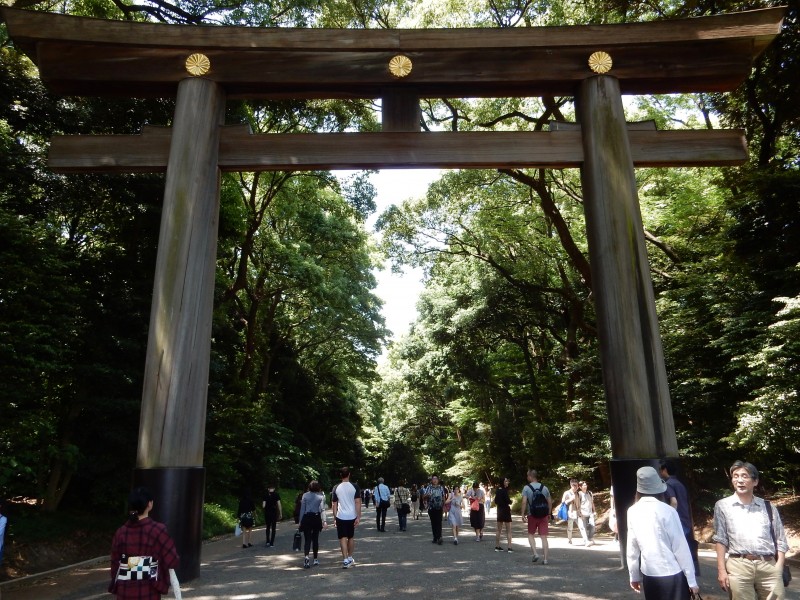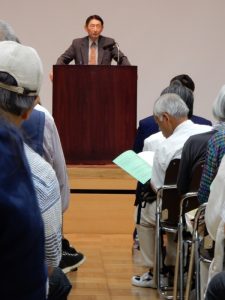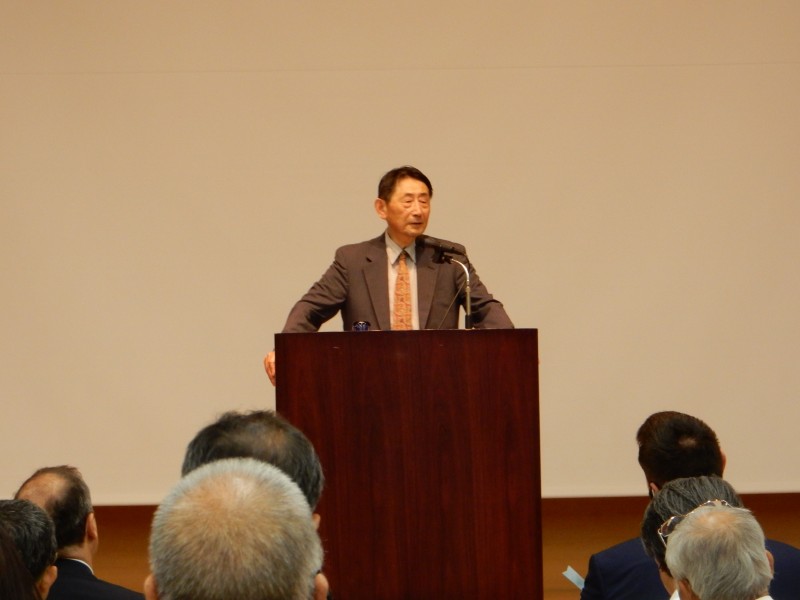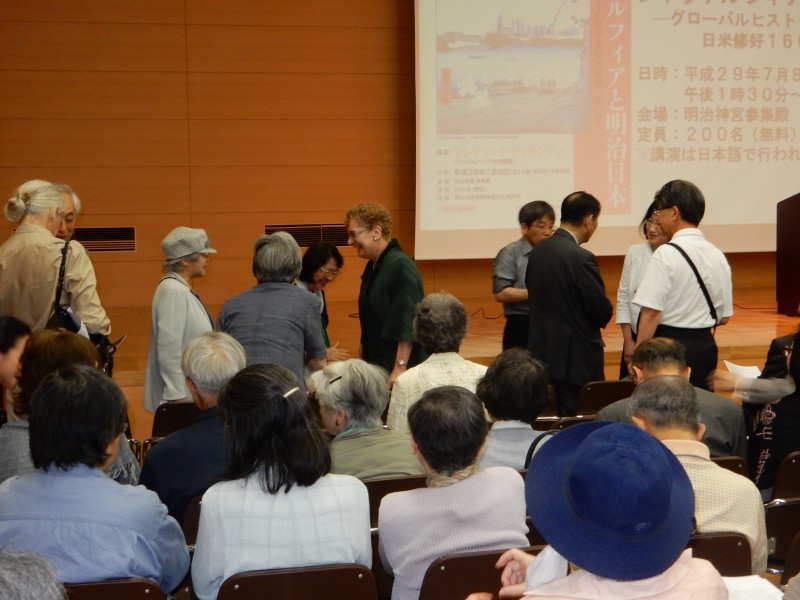
Entrance to Meiji Jingu on a sunny June 3 (all photos Dougill)
On June 3 there was a major event at Meiji Jingu to celebrate 60 years of Irish-Japanese diplomatic relations. It consisted of an introductory talk by the Irish Ambassador followed by two lectures by eminent Hearn scholars. Since one of them was the elderly doyen of Hearn research Sukehiro Hirakawa, I was eager to attend, for he is said to be the driving force behind the recent revival of interest in Hearn, both within Japan and internationally. This is evident in the two thick collections of papers which he edited – Rediscovering Lafcadio Hearn (1997) and Lafcadio Hearn in International Perspectives (2007). I thoroughly enjoyed both of them, particularly the way in which each focussed on different aspects of the multi-talented genius.

Sukehiro Hirakawa (b.1931), professor emeritus of Tokyo University, delivers the keynote address
The subtitle of Hirakawa’s talk was ‘Towards an Irish and Greek Interpretation’, in reference to the circumstances of his birth. Born to a Greek mother and Irish father, Hearn spent his first two years on a Greek island and was then taken to Dublin. This dual background is often linked to his ready acceptance of polytheism (as in the Greek myths of which he was fond in his youth) and also to his interest in the supernatural (as in the Celtic folklore on which he was reared by his Connaught nanny).
Sukehiro Hirakawa, now in his mid-80s, cut a dapper figure and gave a wide-ranging speech that covered very little about Hearn but a lot about the wider appeal of Shinto. In keeping with the venue, his view of the ‘nature religion’ was of a benign indigenous practice that rightfully centred around the emperor and promoted ‘the land of kami’. There was no suggestion here of a universal religion, but rather assertion of the notion that it’s not a religion at all but an intricate part of Japanese culture.
Much of Hirakawa’s talk, not surprisingly, was couched in dated terms. There was constant comparison with Christianity and emphasis on the difficulty for those brought up in a monotheistic culture to understand Shinto thinking. Westerners think humans are created, but Japanese common sense sees people as ‘generated’ in similar fashion to the way that mould naturally appears in moist conditions.
There was however one Westerner who had an instinctive understanding of Shinto and that was Hearn, which for the professor made him so exceptional. Indeed, he was not only able to enter deep into the ‘kokoro’ (heart) of Japanese but he transmuted into Koizumi Yakumo, a figure loved and respected to this day by his adopted land.

Sukehiro Hirakawa explaining the odd beliefs of Shinto for people brought up in a Christian culture
From his first glimpse of Obon with its dance for the dead, Hearn was smitten with the Japanese kinship with the spirit world. The closeness of ordinary Japanese to their ancestral spirits impressed him deeply. He had been obsessed with ghosts since childhood, and his fanciful imagination was easily able to take in such concepts as returning or restless spirits. That all dead become gods to their descendants made perfect sense to Hearn, who was familiar with the notion from his previous experience of non-Christian cultures.
Hirakawa’s talk ended with reference to imperial loyalty shown in his childhood days when people lined up to bow towards Meiji Jingu when crossing the road. Now he complained, young people hardly knew anything of Shinto and were even ignorant of the fact that the emperor was head priest. Why, he wondered, was there no emphasis in school textbooks of Japan’s ‘unbroken imperial line’?
At this point I remembered the mention I’d seen on the internet of Hirakawa’s links to Nippon Kaigi and the move to reintroduce forms of State Shinto. The genial professor emeritus who had begun his talk with promotion of Shinto as a green-loving nature religion ended with a tacit call to strengthen the emperor system of prewar days. Though he didn’t mention it, he could have added that Lafcadio Hearn had urged much the same course, telling his students in Kumamoto that the highest goal which they could aspire was to sacrifice their lives for the emperor.
Unlike Hirakawa sensei, Hearn had the excuse of living at at time when the world was yet to witness the terrible excesses of State Shinto.

The Irish ambassador (centre) talks to members of the audience during a break in proceedings. The event was part of the Irish Embassy’s anniversary celebrations of 60 years of diplomacy with Japan.

Leave a Reply